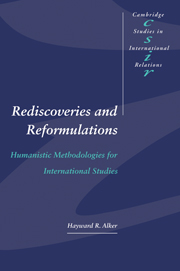Book contents
- Frontmatter
- Contents
- List of figures
- List of tables
- Acknowledgments
- Introduction: Voyages of rediscovery
- Part I Recovering Western antiquity
- 1 The dialectical logic of Thucydides' Melian Dialogue
- 2 Aristotelian political methodologies
- 3 Toynbee's Jesus: Computational hermeneutics and the continuing presence of classical Mediterranean civilization
- Part II The humanistic science of the modern classics
- Part III Contemporary humanistic reformulations
- References
- Index
- CAMBRIDGE STUDIES IN INTERNATIONAL RELATIONS
1 - The dialectical logic of Thucydides' Melian Dialogue
Published online by Cambridge University Press: 13 January 2010
- Frontmatter
- Contents
- List of figures
- List of tables
- Acknowledgments
- Introduction: Voyages of rediscovery
- Part I Recovering Western antiquity
- 1 The dialectical logic of Thucydides' Melian Dialogue
- 2 Aristotelian political methodologies
- 3 Toynbee's Jesus: Computational hermeneutics and the continuing presence of classical Mediterranean civilization
- Part II The humanistic science of the modern classics
- Part III Contemporary humanistic reformulations
- References
- Index
- CAMBRIDGE STUDIES IN INTERNATIONAL RELATIONS
Summary
The Melian Dialogue is “at the same time … the result of art … [and] the reflection of reality”
R. Aron (1984: 28)In writing his classic study of the Peloponnesian War, Thucydides sought “an exact knowledge of the past as an aid to the interpretation of the future, which in the course of human things it must resemble if it does not reflect it” (I.22). For twentieth-century British and American realists, e.g., Wight (1978: 24) and Morgenthau (1978: 8–9, 38), this has typically meant seeking supreme, timeless or even eternal truths – perhaps even expressible as mathematical laws – about the state's eternal, self-interested search for power and the need to balance against it. Werner Jaeger's reference to “This political necessity, the mere mathematics of-power politics” conveyed a similar realist message to the German-speaking world of the 1930s; indeed, in a book widely renowned for its penetrating and inspirational account of Greek civic culture, Jaeger asserts that this “necessity” “is defined [by Thucydides] as the true cause … of the war” (Jaeger 1976: 488, my emphasis).
Would not any other social scientist in our own century, if desirous of emulating the increasingly universal validity of the natural sciences and committed to building up reliable knowledge grounded in the deductive certainty of axiomatic formal argument and the “positive” evidence of our senses, also want to claim to “have written my work, not as an essay which is to win the applause of the moment, but as a possession for all time”?
- Type
- Chapter
- Information
- Rediscoveries and ReformulationsHumanistic Methodologies for International Studies, pp. 23 - 63Publisher: Cambridge University PressPrint publication year: 1996



